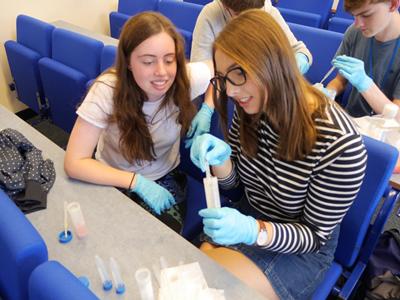Southampton hosts young scientists on popular science and engineering course

Fledgling scientists tested their skills using the very latest in biomedical technology and methods at the University of Southampton. The popular annual residential course is organised by the Smallpeice Trust and supported by researchers at the universities of Southampton and Liverpool; the national charity for assistive technology, Designability; and from biomedical engineers from Salisbury District Hospital.
During the four-day course 24 young students were given demonstrations on techniques such as medical sensing, fracture fixation, motion analysis and measuring muscle. The students were then split into teams and challenged to create their own medical device designed to give practical assistance to people living with disability. The laboratory design sessions were overseen by the University and Designability teams who worked with the young scientists to help bring their ideas to reality.
Dr. Nick Evans, Centre for Human Development, Stem Cells and Regeneration at the University of Southampton, said: “This course is fantastic, engaging way for students to interact with some of the University of Southampton’s talented research scientists. I think the students now realise that engineering isn’t just about making a better car, but is really important for designing medical technology that makes a real difference to patients’ lives.
“The enthusiasm of the activity leaders and facilitators really helped show how exciting this area of science is and many of the students left the course strongly considering biomedical engineering as a career pathway. In fact, some previous Smallpeice attendees are now University of Southampton postgraduates.”
The popular course is organised each year by The Smallpeice Trust, which works nationally to inspire young minds to look at careers in science and engineering. The four day residential courses are designed to help young people experience living and working in a university environment, and to offer insight into how their own knowledge and interests can be applied in the world of work.
Jess Riders, Industrial Designer and Researcher, Designability, said: “These Smallpeice courses are a brilliant opportunity to inspire young minds. It ignites creativity, allows young people to realise their strengths and interests and raises awareness of the multitude of pathways and opportunities that surround engineering and medical-related careers.
“We had a brilliant time demonstrating the applications of inclusive design thinking; teaching classes about designing around the user and demonstrating Designability’s design process through a ‘Design and Make’ challenge where we asked our groups to design an inclusive product for someone living with a disability. Our groups designed Fire Band- a fire alert wrist band for people who are deaf and The Garden Buddy- a multi-purpose gardening trolley for people living with restricted mobility.”
Craig Carrington, Head of Marketing at The Smallpeice Trust, said: “The Smallpeice Trust is about making young people think bigger, and imagine more, by allowing them to work with some of the biggest innovators in science and engineering. The advent of the Internet of Things and the use of new materials is revolutionizing the biomedical sector, as we search for new ways to improve the quality of life for all. By allowing bright young minds to see how they can put their ideas into action, we hope to inspire the next generation of scientists.”
